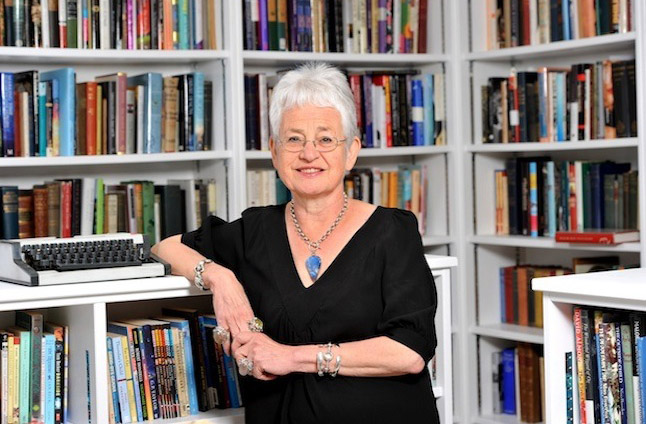Her books have been treasured companions of childhood for over 20 years, their fun, feisty characters – with very real worries and dreams – still capturing the spirit of what it means to be a child today. Whether it’s playground spats and sibling rivalry in Double Act or dealing with divorce in The Suitcase Kid, Jacqueline Wilson’s ability to really speak to her readers, without ever losing her lightness of touch, is key to all her wonderful works.
“I think it’s because I still have vivid memories of what it feels like to be a child,” she considers, speaking to me from her London home. “I can’t remember what I was thinking five years ago, but I remember what I felt when I was ten, so it’s easy to remember myself back there.”
Wilson, whose kindly, chatty personality comes through instantly, was born in Bath but grew up in Kingston upon Thames, an only child who delighted in reading and dreaming up her own stories.
“I had very girly taste, I liked Little Women, What Katy Did and the E Nesbit books. I was a passionate reader; I lived in the local library. I loved writing stories, and apparently at the age of six, when I was having my tonsils out, the doctor asked what I wanted to be when I grew up and I said quite solemnly, ‘a writer!’.”
Wilson still has a tatty notebook containing one of her first stories, Meet the Maggots, written aged nine. Though she admits: “I don’t think I showed any remarkable talent, I’m sure many children of nine could do much better!”
The author still lives in Kingston today, in a Victorian house populated by two cats and too many books. “I can’t stop buying books: if I live to 500 I still wouldn’t get through them all,” she smiles.
As for the cats, meet Jacob and Lily: “Jacob is much bigger, Lily is quite little and delicate,” Wilson tells me. “She’s fascinated by the computer and thinks she can write too, and patters across and deletes everything I’ve written.”
Dogs and cats form the inspiration behind her latest book, Paws and Whiskers, which she will be discussing at Cambridge Literary Festival. It’s a treasury of excerpts from her own favourite dog and cat tales, including a new story from Wilson herself. She’s also asked some of her literary chums like Philip Pullman to write a bit about their own pets, “because children always love to know what animals you’ve got.”
Wilson keeps in touch with her readers through her blog and tries to get through the mountains of letters sent in by fans. “I used to pride myself on writing back to every child that wrote to me,” she admits, “but it’s just impossible now. But if a child has tried extra hard or said something quirky, I’ll write back.” She laughs a tinkly laugh: “Just yesterday a child wrote to say that all the children in her class had told her I was married to Roald Dahl, and was this true?!
“Also, because I was born in Bath, a lot of the younger children take this literally and think I was born in a bath! It’s very sweet.”
Wilson’s first job was for the publishing company that launched Jackie magazine (they told her they’d named it after her, though she’s not sure if they were “just being sweet”). She then penned a few crime fiction novels for adults before focusing solely on children’s novels, her big break occurring in 1991 with The Story of Tracy Beaker.
So what advice would she give to budding children’s writers?
“First of all, take it seriously. Some people think that anyone can make up a kids’ story, but I think every writer for children worth their salt takes as much trouble as they would do writing the most high-flown literary novel. Also to write from a child’s point of view.”
As any fan will know, Jacqueline Wilson books wouldn’t be the same without Nick Sharratt’s zany illustrations. I wonder if she describes the way she wants her characters to look, but Wilson replies: “I don’t tell him anything extra. He reads the book several times and nearly always, when I see the way he’s illustrated a character, it’s as if he’s got into my head and seen how I imagined them to look.”
Another important contributor is Wilson’s daughter, Emma, who casts an encouraging eye over every manuscript. “She’s a professor at Corpus Christi, so it’s always a lovely excuse to come to Cambridge,” beams Wilson.
I’ve no doubt that anyone going to Wilson’s talk is in for a treat. Making reading fun is something Wilson feels very strongly about, saying: “Even in this age of Playstations, there is still a time to introduce a child to the joy of simple stories. Sometimes children say they hate reading, that it’s so boring; but if you can only find the one book that gets them going because it chimes with something they’re interested in, then you’ve turned them into a reader.”

